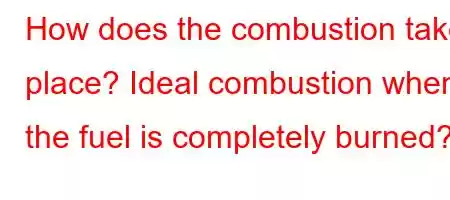Guidelines How does combustion take placeIdeal combustion when the fuel is completely burned?
How does the combustion take place when the ideal combustion fuel is completely burned?
How does the combustion take place In order for the combustion to take place, combustible material, combustible substance (Oxygen gas) and ignition temperature are required. 6 IDEAL COMBUSTION When the fuel is completely burned, the carbon (C) in it turns into carbon dioxide (CO2) hydrogen (H) water vapor (H2O) sulfur (S) sulfur dioxide (SO2).
What is a combustion reaction?
What is a Combustion Reaction If oxygen gas (O 2 ) is used in a chemical reaction, this type of reaction is called a "combustion reaction". 4 Characteristics of the Combustion Reaction In the combustion reaction, heat is released. Combustion is a chemical phenomenon. The structure of matter changes. Combustion reactions usually produce carbon dioxide and water. Combustion that does not produce water or carbon dioxide
4 How does combustion occur?
There are also combustion reactions that do not produce water or carbon dioxide. The bonds between the substance entering the combustion reaction are broken and new bonds are formed. Combustion is also known as oxidation. 5 How the combustion event takes place In order for the combustion to take place, the combustible substance, the combustible substance (Oxygen gas) and the ignition temperature are required. 6 IDEAL COMBUSTION
Chemical changes that occur after a chemical change?
As a result, changes in these properties are also called chemical changes. In short, changes in the internal structure of matter are chemical changes. After a chemical change, both the internal structure and the external structure of the substance change. The substance that undergoes chemical change loses its chemical properties and gains new properties.
Combustion reactions produce carbon dioxide and water.?
Combustion reactions usually produce carbon dioxide and water. There are also combustion reactions that do not produce water or carbon dioxide. The bonds between the substance entering the combustion reaction are broken and new bonds are formed. Combustion is also known as oxidation.
Read: 192


